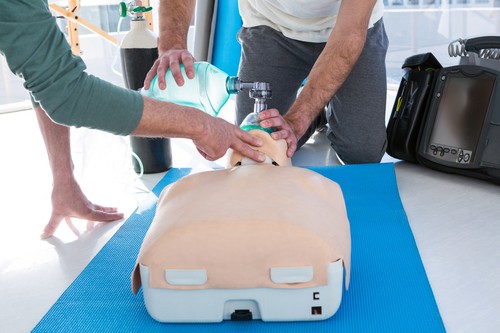Most people with respiratory problems are probably familiar with the hassle of needing to be close to an oxygen tank at all times. While an oxygen tank does provide a constant supply of oxygen, it’s too bulky and heavy to allow a user to move freely—especially outside of the home. Due to a high demand for a more portable source of oxygen, oxygen concentrators were developed. What are oxygen concentrators and how do they work? Let’s take a closer look to find out.
Oxygen concentrators are relatively small devices that filter the air from your surrounding room and concentrate it for controlled and monitored delivery of fresh oxygen all day long. Most models are about the size of a small carry-on suit case and powered by plugging into a standard home electrical outlet. But there are also battery-powered portable models that are small enough to be carried like a small shoulder bag and weigh as little as 2 pounds. However, smaller doesn’t always mean less effective. In fact, because of the way it works, an oxygen concentrator an endless supply of oxygen compared to a high-capacity oxygen tank.
How Do Oxygen Concentrators Work?
Instead of storing a limited amount of oxygen, oxygen concentrators filter the oxygen directly from the surrounding air. Here’s a quick breakdown of how these devices work:
- A fan draws air inside the device.
- The air is compressed and dust particles are filtered out.
- Other gases such as nitrogen and smaller particles are filtered out with a series of molecular sieves.
- The purified oxygen is pumped out at a certain volume, which can be changed according to the user’s needs.
- The purified oxygen is delivered either through a breathing mask or a nasal tube.
Depending on the model, an oxygen concentrator can run on batteries or by directly plugging it into a wall outlet.
Why Go For Oxygen Concentrators?
You probably think that the only thing oxygen concentrators have going for them is their portability, but they actually have other major advantages over oxygen tanks.
- Better mobility – Oxygen tank users have to make sure they are close to at least one oxygen tank at all times. Unfortunately, this means they can’t just leave their homes unless they’re willing to bring heavy pressurized tanks with them. Carrying these tanks around almost always requires assistance, so traveling solo is rarely (if ever) an option.
On the other hand, oxygen concentrators come with ergonomic handles, wheels, and – for the smaller models – straps that allow users to carry their concentrators unassisted. Users have more freedom to go where they please, and even taking public transportation is possible.
- More consistent supply – When an oxygen tank runs out of oxygen, it has to be replaced with another tank. Replacement tanks have to be delivered to the user, which may take a lot of time. It also means you’ll have at least a few bulky tanks cluttering the place at all times.
An oxygen concentrator will keep pumping out a steady supply of oxygen as long as it’s connected to an outlet or until it runs out of batteries. This means users do not have to worry about running out of oxygen at the worst moments. Furthermore, the portable size allows you to keep getting oxygen even in areas where bulky oxygen tanks won’t fit.
- Better safety – When there’s pressure, there’s a risk of explosion, and oxygen tanks are no exception. This is especially true during summer season, when the heat can be severe enough to drastically increase the pressure inside the tank. An oxygen tank exposed to sunlight for a long time can be a ticking time bomb.
Since an oxygen concentrator doesn’t store large amounts of pressurized air, there’s no risk of explosion. Furthermore, electronic controls allow a finer degree of control over the flow of oxygen compared to a twist valve, so you’re less likely to get into a scenario where the patient is getting too much or too little oxygen.
Oxygen concentrators are proof that sometimes the good things come in small packages. If you or someone you know needs a dependable supply of oxygen, buying or renting an oxygen concentrator should be your first option.
Recent Posts
- Castor Oil For Better Hair Growth: Is It Myth Or Fact?
- Exploring the Differences Between Sermorelin, Ipamorelin, Ibutamoren, GHRP2, and GHRP6: Understanding Their Role in Human Growth Hormone Regulation
- Unraveling the Mystery: Understanding the Causes and Prognosis of Ventricular Tachycardia Without Apparent Heart Disease
- Understanding Grandparents’ Rights in Oklahoma: Navigating Visitation and Legal Protections
- 10 Reasons to Consider Hypnotherapy for Your Health

